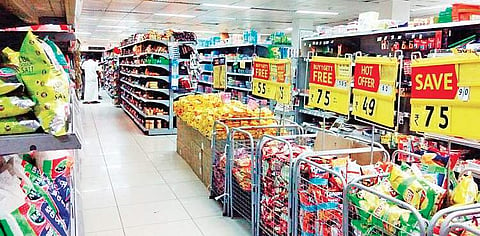

MUMBAI: The first month of the GST rollout appears to have been smoother than imagined. Several companies’ sales volumes and profits took a hit, and analysts warn of more carnage spilling into the second quarter. Typically, when sales fall, brokerages and investors dump the stocks, causing mayhem. But, this time around, markets aren’t tossing the scrips, as experts say long-term benefits will far outweigh the GST’s transitory impact.
Quarterly results of some of the consumer goods companies such as Marico, V-Guard, Godrej, Hindustan Unilever all had one common concern: de-stocking by traders in the run-up to GST implementation. While some firms were prompt in revising sticker prices factoring in new tax rates, others are yet to do so.
Analysts warn volumes and sales may remain weak for a few months, as GST disrupted supplies, prompting outlets to cut inventories.
Consumer goods companies like toothpaste maker Colgate-Palmolive, Godrej Consumer Products, Marico and Emami Ltd, saw sales and profits fall behind Street estimates as dealers cut inventories. For some of these companies, it was a double whammy, as they were just coming out the note-ban effect.
For instance, Marico saw its profits plunge 12 per cent in the June quarter at Rs 236 crore as against Rs 268 crore a year ago.
The FMCG major also saw an almost 4 per cent fall in its consolidated revenue, which it attributed to the de-stocking effect and steep inventory correction. Despite a significant increase in input costs, the company held back price rise in fast-moving product categories like Parachute Rigids. In the near-term, input costs are likely to increase further and Marico will have to revise prices in the months to come.
Owing to de-stocking, Parachute’s volumes fell 9 per cent during the June quarter solely because of trade inventory correction. Likewise, its Saffola refined edible oils franchise too saw volumes dipping by 9 per cent, while hair oils saw 8 per cent fall. During the quarter, Marico did launch new packaging in some product categories, but it failed to stem the slide.
“While the operating performance for the quarter was below par, we continued with our renewed thrust on innovation, which is evident from a slew of new launches…We believe that GST will help organized players in the long-run,” said Saugata Gupta, MD & CEO, Marico in a statement.
Then there’s Godrej Consumers that turned in a disappointing set of numbers, posting its slowest pace of revenue growth in 13 quarters, partially clouded by GST transition. “While sales in April and May were strong, June sales growth dipped due to channel destocking in the run-up to the implementation of the transformative GST,” said Nisaba Godrej, Executive Chairperson, Godrej Consumers.
But the maker of soaps and hair oils expects the situation to normalise in the second quarter. “We look forward to stronger growth in the second half of the year,” Nisaba explained.
The tax, overall, saw inventory correction and volume sales simply grind to a halt in June for most companies. But firms aren’t really fretting. Instead, they hope the current quarter will likely see a positive impact and help organised players in the long-run.
For VIP, which jacked up prices by 6 per cent (as the tax slab rose from 18 per cent pre-GST to 28 per cent now), June quarter revenue rose 9 per cent over last year, but sales in June were subdued. The company strongly believes GST is a short-term dampener.
Likewise, tyre maker Ceat saw its consolidated net profit fall a whopping 98.6 per cent to Rs 1.28 crore due to destocking, but Ceat says it is transitory. “We expect it (GST) to bring positive impact for the tyre industry in the long-run,” said Anand Goenka, MD, Ceat.
Among the worst hit is the auto sector, which was already reeling under stress with muted sales owing to changes in BS-III emission norms. Passenger vehicle sales, particularly, were adversely impacted during the June quarter in anticipation of a price reduction due to GST. Auto maker M&M saw its profits plunge 20 per cent during the June quarter and its sales during the quarter were the lowest in the past 13 quarters.